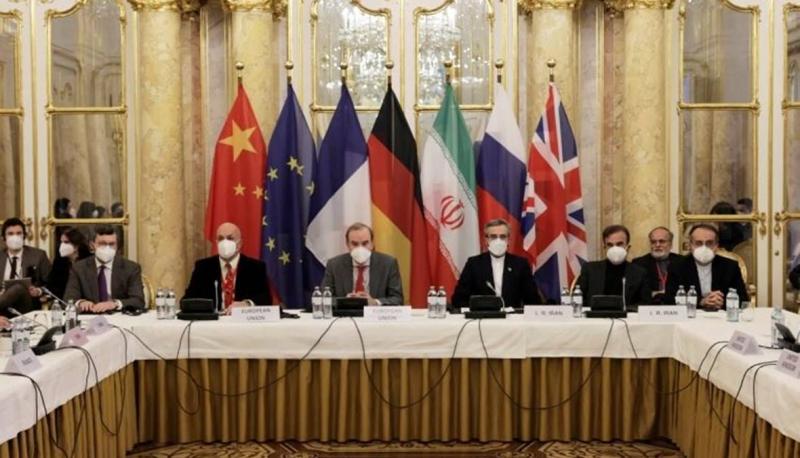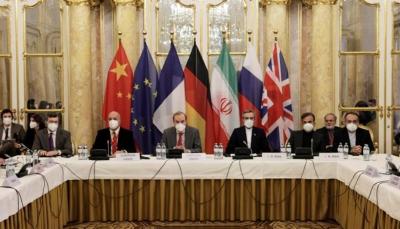Is a bad deal with the Islamic Republic of Iran better than no deal at all that could lead to war and to the absence of any oversight on the Iranian nuclear program? Or is it worse to accept a bad deal that rewards the regime in Tehran for its nuclear transgressions and destructive extortion with massive funds that finance Iranian nuclear, strategic, and regional ambitions? The Biden administration believes that a bad deal is better than the worse alternative of dragging the United States into war with Iran to prevent its determination to acquire nuclear weapons. This obsession with wars that directly involve American forces and result in the loss of lives is a key, though not the only, factor behind President Joe Biden's determination and his team's push for a deal out of fear of the worst. It seems that an agreement to revive the JCPOA nuclear agreement is imminent, despite the rising voices of opposition from Republicans and Israel, although it is not yet guaranteed. Instead of letting panic control emotions whether the negotiations fail or succeed, it is essential to adopt wisdom, pragmatism, and rationality to start exploring options.
No one wants a war to stop Iran's march towards possessing a nuclear bomb. Not Iran, Israel, the U.S., Europe, China, or Russia, and certainly not the Arab states in the Gulf and the Levant.
Those who wish for a war between Iran and Israel to restrain one or both live in a land of dreams and illusions, with various reasons including the historical pacification relationship between Persians and Jews that has prevented any direct confrontation between Iran and Israel and continues to do so. Proxy wars, as seen in Lebanon, serve both the Iranian and Israeli sides as they spare them from direct confrontation and allow for the destruction of non-Iranian and non-Israeli lives. Those who envision Israel as the savior from Iranian dominance over Lebanon and Syria are mistaken, as Israel is only interested in neutralizing the Lebanese and Syrian fronts at its borders in exchange for Iranian commitments to restrain Hezbollah and its weapons, without caring about what Hezbollah and the Islamic Republic do internally in Lebanon. Neither Israel nor Iran are friends of Lebanon; rather, they are both its enemies.
What is happening on the sidelines of the negotiations to revive the nuclear agreement—related to regional issues—falls under the realm of "Gentlemen's agreements" between Iran and Israel, and between Iran and various Arab Gulf states with American, European, and even Russian sponsorship.
Despite the increasing public opposition from Israel to a "bad deal"—not to the principle of reaching an agreement with Iran—there is a hidden pulse of awareness in Israel that, in the event of failed negotiations, Israel will not be able to stop the Iranian nuclear program with military strikes alone. The military solution to the Iranian nuclear dilemma requires effective American participation in the war, which is what the Biden administration and American public opinion do not want.
Israeli political and security leaders state that they will not adhere to the agreement if they do not agree with it. This is a form of distancing from a "bad deal," allowing Israel to maintain justification for continuing its covert military operations inside Iran when necessary. Thus, Israel benefits from the limitations that the agreement will impose on the Iranian nuclear program while enjoying the freedom to act with strikes and operations, as it is not a signatory to the agreement between Iran and the P5+1.
This does not fall under the category of "Gentlemen's agreements" between Israel and Iran but may enter the realm of undisclosed American-Israeli understandings. The nuclear issue and oversight of nuclear facilities remain contentious today, which could impede the agreement unless Iran retracts its insistence on limited scrutiny and control by the International Atomic Energy Agency (IAEA). Tehran rejects full audits and opposes strict oversight mechanisms because it has indeed entered a stage of uranium enrichment at military levels. The Biden administration recognizes that its concessions on this matter are likely to lead to a complete obstruction of the agreement in Congress as well as serious, not merely cosmetic, Israeli opposition, as it appears now.
Gentlemen's agreements between Israel and Iran relate to neutralizing the Lebanese-Israeli and Syrian-Israeli borders, something that several states in the P5+1 group are trying to sponsor. How will such an understanding affect Hezbollah's armament and role in Lebanon? The main idea is to ensure that Tehran guarantees that Hezbollah's weapons will not be directed against Israel or used across the border, and its missiles become domesticated.
In other words, resistance against Israel is effectively neutralized by an Iranian decision, while Hezbollah can continue to eloquently articulate the rhetoric of resistance for consumer reasons and to exert the intimidating power of weapons over the Lebanese internal landscape.
There are two opinions: one considers such an understanding to be in Lebanon's interest as it spares it from an Iranian-Israeli war hosted by Hezbollah in Lebanon, which would destroy it, forcing the Lebanese people to pay the price. The other opinion views such agreements as a malicious deal that benefits both Iran and Israel while causing severe harm to Lebanon by placing it under Iranian guardianship and Hezbollah's weapons.
Then, there are wishes. Wishes that the neutralization of resistance and the establishment of Iranian-Israeli calming will lead to new atmospheres, especially in light of the delineation of Lebanese-Israeli maritime borders and the extraction of oil and gas with Iranian approval. Wishes that Iranian agreements with the U.S. and Europe will lead to a natural taming of extremist Iranian thought due to Iran's pressing need to implement its economic revival project becoming a priority. Wishes that Iran's engagement in the global economic order and partnerships with European companies will reflect an openness, modernization, and distraction with developmental projects instead of destructive ones.
These are, of course, wishes and not policies, but they are wishes that could transform into policies if all global, regional, and domestic parties play their roles without demagoguery or following patterns of submission like a herd or burying their heads in the sand. The responsibility for this lies with the Americans, Europeans, Lebanese, and also Arabs. For Iran alone will not reinvent itself, nor will it give up its expansionist appetite, nor will it contain the "Revolutionary Guard" and its domineering projects. It needs serious pressures and a stick-and-carrot equation if it is to restrain its overwhelming dominance a bit.
Iraq, Syria, and Lebanon will not escape the Iranian umbrella by a decision from the "Revolutionary Guard" or the supreme Iranian leadership. Gradually softening dominance is what is on the minds of American and European leaders, but wait... wait so as not to negatively affect European oil and gas priorities. The reality is that Iraq is no longer prominent on global radars, beginning with the American and European radar and ending with the Russian and Chinese radar that are very comfortable with Iran's dominance over Iraq, Syria, and Lebanon, as it is a partner for both in the autocratic troika.
The question is, why would the United States finance the implementation of Iran's regional agenda and "troika" as an established fact when lifting sanctions and injecting billions of dollars into the mullahs' regime and the "Revolutionary Guard" that would simultaneously enjoy global recognition of its legitimacy and retain its nuclear capabilities? "It’s war, you fool," could be said, referring to the obsession with the fear of America entering direct wars.
On the other hand, it could be said that the stupidity lies in America's funding of Iran's nuclear agenda. This is because Iran without money will slow down its nuclear programs and will practically bind its hands due to a lack of funds, which could lead to the halting or restraining of the nuclear program under ongoing sanctions. Moreover, injecting billions of dollars into the regime’s hands will speed up the secret nuclear program that will never succumb to oversight mechanisms that expose it.
It could be added, from the perspective of short-sighted strategic thinking, that freeing Iran from sanctions serves China and Russia, as it is a strategic partner for them and has comprehensive long-term agreements with them that are economically and militarily substantial. Moreover, freeing Iran from sanctions directly benefits Russia, which receives useful drones from it for its war in Ukraine, is preparing advanced arms deals with it, and plans to utilize its means to bypass Western sanctions imposed on its oil through Iran.
The need for Iranian oil and gas is not the only motivator behind the Biden administration's and European governments' overwhelming push. It is an old strategy culminating in the JCPOA in 2015 during Democratic President Barack Obama’s tenure. It is a love story for many in the Democratic Party and the European Union with the regime in Tehran and its men. It is also a story of revenge against former Republican President Donald Trump, who tore up the 2015 agreement and placed Iran under sanctions that crippled it. It is the story of rewarding transgressions and yielding under extortion and threats.
However, returning to wishes and considering what to do amid developments that suggest the nuclear deal is forthcoming, and soon... what the P5+1 countries care about includes ensuring there are "Gentlemen's agreements" under which Iran commits not to jeopardize Gulf security and international navigation, not to continue its activities aimed at destabilizing the region, and not to interfere in the internal affairs of Arab Gulf states.
These countries are opening up to the Islamic Republic of Iran in an attempt to influence its governmental performance rather than its doctrine. Saudi-Iranian talks and Omani, Qatari, and other mediations fall under the category of quiet Gulf efforts to control tensions, accompanied by wishes that Iran becomes less aggressive and extreme, and more accepting of coexistence based on mutual respect. Therefore, Arab Gulf states are sending a message to the Islamic Republic of Iran: Keep your religious and ideological message, but separate it from the governmental performance that must be politically realistic.
What is on the minds of the Gulf states is an extension of American and European wishes that the new agreement will lead to changes in Iranian regional behavior, hoping that the Islamic Republic becomes less "revolutionary" and transforms into a normal and modern state.
Wishes or understandings? Wishes or policies? Or are all of them transactions for purposes of their own within "Jacob’s purposes" and for national interests that are, by nature, utterly selfish? Let’s wait and see if beneath the layers of "Gentlemen’s agreements" there is something that surprises and delights us, even if just a little, as we enter the season of wishes.




